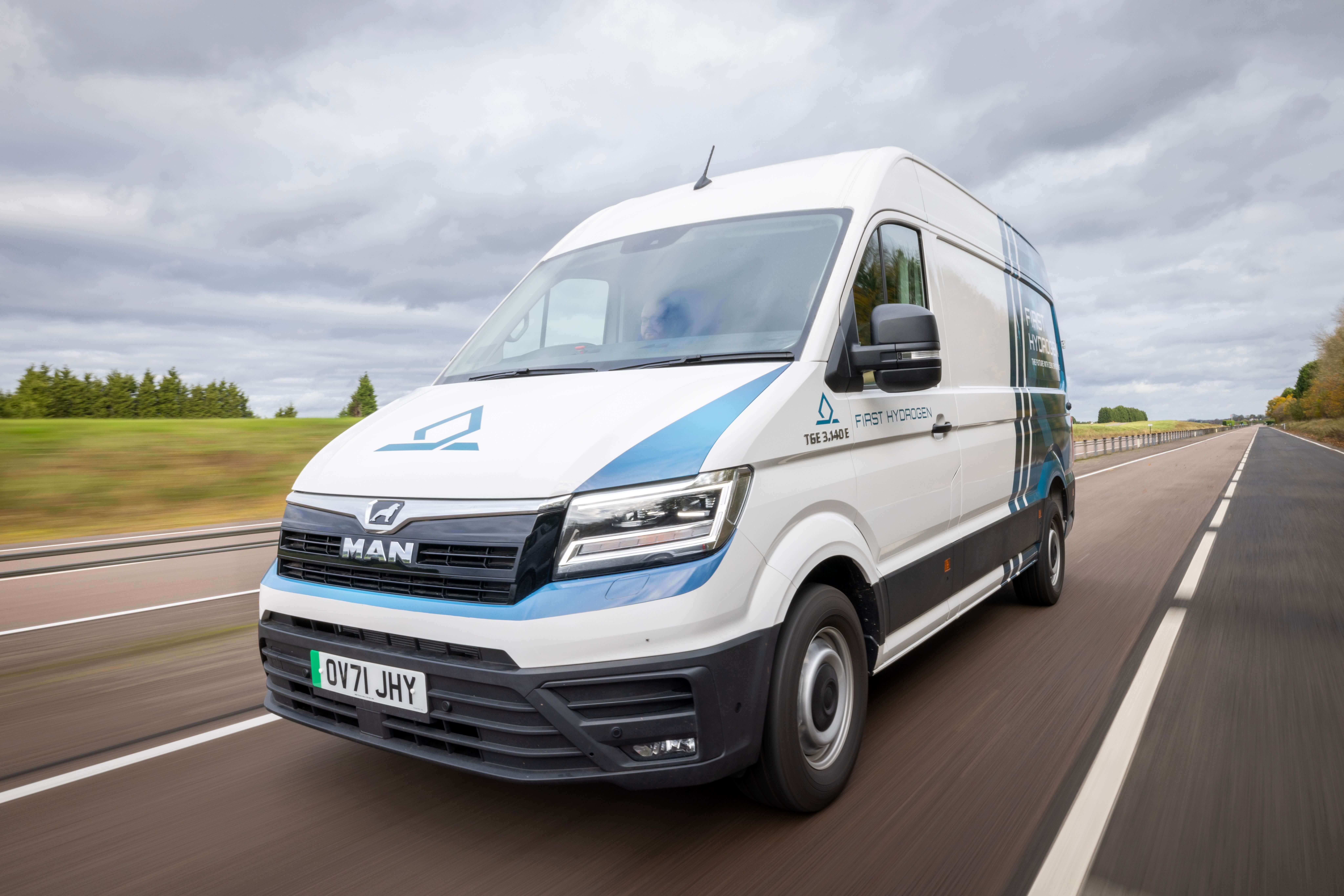Promising start
The start of the test series under real road conditions for the hydrogen fuel cell-powered light commercial vehicles developed in collaboration with world market leaders AVL Powertrain and Ballard Power could not have gotten off to a better start. Rivus, who tested the vans developed by First Hydrogen as part of the British "Aggregated Hydrogen Freight Consortium" AHFC, particularly highlighted the smooth ride and pleasant handling. Also standing out was the perfectly tuned automatic transmission, which test drivers said was significantly easier to operate than in diesel or gasoline-powered vans.
In addition, the hard facts show a clear plus for First Hydrogen's "Light Commercial Vehicles" developed with hydrogen fuel cells compared to battery-electric vans. For example, ranges of well over 500 km could be achieved. The refueling process takes between 5 and 7 minutes, comparable to a vehicle powered by fossil fuels, while electric vehicles have to spend hours at the energy pumps. Rivus covered around 6,000 km on various terrains both inside and outside the city. In the process, the consensus fuel consumption of the LCV was analyzed to be less than 2 kg/100 km, and even less than 1.5 kg/100 km in urban traffic.
Large utility company takes over the baton
16 major fleet operators from industries such as food, delivery, healthcare and utilities are participating in the tests, each lasting 4 weeks and coordinated by the Aggregated Hydrogen Freight Consortium (AHFC). Data collected by onboard telematics will then be analyzed and comparisons made between battery electric vehicles and internal combustion engine vans.
With the British utility company SSE, another high-profile company is continuing the series of tests at its site in Aberdeen, Scotland. Known as the largest for low-carbon energy infrastructure, the Company operates one of the largest vehicle fleets in the UK. The FTSE 100 company has already committed to converting 2,500 of its vehicles to electric. In addition, SSE builds, operates and invests in carbon-neutral power infrastructure through onshore and offshore wind farms, hydropower, grids for power transmission and distribution, power plants, carbon capture and hydrogen storage, solar power and batteries, and the provision of energy products and services to businesses and other customers.
The environment close to the Company's headquarters in Aberdeen is particularly suitable for the test drives under real road conditions, as it benefits from one of the best hydrogen infrastructures in the UK. Following the positive experiences of the initial tests, SSE is also expected to closely analyze the data collected via the onboard instruments regarding fuel consumption, usage, and efficiency to calculate the overall costs. Previously, there has been a focus on battery-powered vans, but based on the test results, a shift towards hydrogen-powered units may be considered.
Ronnie Fleming, Chief Procurement Officer at SSE, commented: "As part of our commitment to achieving net zero, and in addition to our leading EV100 commitment, we are keen to test all alternative fuels for our fleet. We look forward to seeing the vehicles in action so our drivers can experience them in operation and our fleet managers can evaluate how hydrogen vehicles might fit into our future fleets."
First Hydrogen aims to enter the commercial market with its first generation hydrogen-powered light commercial vehicles between 2025 and 2026. According to CEO Balraj Mann, between 10,000 and 20,000 units are expected to be sold initially. With an estimated selling price of around EUR 50,000, this business segment alone could generate revenues of up to EUR 1 billion in the best-case scenario. In comparison, the current market capitalization of First Hydrogen is EUR 102.22 million.

Solving the chicken-and-egg problem
However, the management team's plans, which are peppered with experienced managers from the energy and automotive industries, go much further. Currently there are still two problems with the use of green hydrogen for the mass market. First, the gas is still expensive, and second, infrastructure is largely lacking to make vehicle refueling seamless. By building a closed hydrogen value chain and a "Hydrogen-as-a-Service" business model, First Hydrogen aims to patch that dent.
For example, the Canadians are developing a prototype for a customized refueling system with German company FEV Consulting GmbH. In addition, the Company wants to push ahead with its own production and distribution of green hydrogen in the UK, Europe and North America. As a result, First Hydrogen is likely to benefit in more ways than one from the subsidy programs launched by governments to support hydrogen projects.
Flagship project in Canada
In Shawinigan, Quebec, First Hydrogen closed a promising deal. The Company acquired two plots of land ideally suited for developing a green hydrogen ecosystem. Here, the hydrogen innovator plans to produce up to 35 MW of green hydrogen annually using advanced electrolysis technology.
The produced hydrogen will be distributed in the Montreal-Quebec City corridor. This will serve First Hydrogen's light-duty vehicles and support third-party hydrogen-powered vehicles. In addition, the Company plans to build a production facility for its hydrogen-powered commercial vehicles with an annual capacity of 25,000 units. In order to ensure the project's feasibility, the feasibility study is scheduled to be completed in mid-2024.

Interim conclusion
The first series of tests of hydrogen fuel cell-powered light-duty vehicles with a range of over 500 km ended with results that exceeded estimated projections. Now another 4-week phase with a big player is starting with utility company SSE, one of the largest fleet operators in the UK. If results again exceed expectations, the conversion of these test companies into potential customers for the future becomes increasingly likely. In terms of a closed hydrogen value chain, a milestone was reached with the acquisition of two properties in Quebec. Currently, First Hydrogen's vision is still in its infancy. However, with continued consistent execution, the Company is likely to face a revaluation in the long term.
The update is based on the initial report 07/2022

